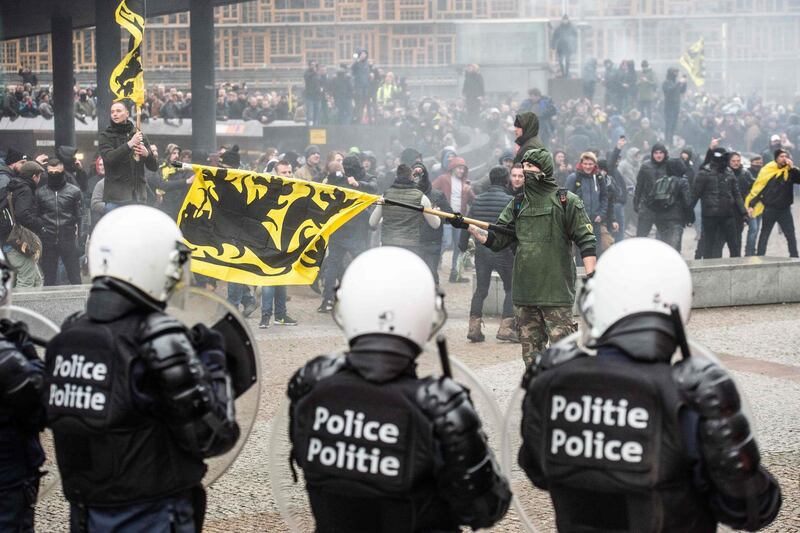Belgium’s right-wing opposition is seeking early national elections to capitalise on public disquiet over a UN migration pact that brought thousands of demonstrators on to the streets of Brussels.
Prime Minister Charles Michel could be forced to hold elections in February if he fails to win parliament’s backing after his decision to back the deal brought down his ruling coalition.
Mr Michel travelled to Marrakesh, Morocco, earlier this month to sign the pact, along with more than 150 other countries, despite losing four ministers from former coalition partner the New Flemish Alliance (N-VA).
Political analysts believe the N-VA will see a surge in support because of its opposition to the vote and coalition pullout. It has called for a confidence vote in Mr Michel which could trigger national elections.
“That’s the reason why they want early elections - because that would be the Marrakesh elections,” said Professor Carl Devos, a political scientist at the University of Ghent. “At first they [anti-pact parties] tried to avoid early elections – now they want them.”
One of four ministers to quit over the Marrakesh plan was Theo Francken, the hardline migration chief, who had previously called for a public park to be “cleaned” of asylum seekers and accused a medical charity of involvement in people smuggling.
________________
Read more:
[ Scuffles as Brussels anti-migration rally draws thousands ]
[ Desertion over UN migration pact leaves Belgium with minority government ]
________________
The deal has divided Belgian public opinion that has shifted towards more anti-migrant policies and leaders in line with much of Europe.
Police used teargas and water cannon to break-up scuffles on Sunday after an estimated 5,500 people answered calls by far-right groups to descend on Brussels in protest at the Marrakesh agreement.
Many carried banners saying: “Our people first” and “We have had enough, close the borders” while others called on Mr Michel to quit. Some 90 people were arrested in the skirmishes.
A counter-demonstration drew around 1,000 people to another Brussels district, according to police. Belgian authorities had initially banned both rallies fearing unrest but the country's supreme administrative court the Council of State overturned the decision.
The leadership of Mr Michel, who claimed he still had the support of two-thirds of the parliament for the pact, is now in the balance. “In the name of my country, I assure you that Belgium is committed to supporting this migration pact,” he told the meeting.
The N-VA, which favours the accelerated deportation of migrants, claimed that the pact meant giving up sovereignty over the country’s borders. The agreement is designed to frame an effective international approach to migration but charities have voiced doubt about how it would work.
Pope Francis on Sunday voiced his support for the agreement and urged the international community to show "responsibility, solidarity and compassion" in dealing with migrants. But its provisions are not legally binding and detractors warn it could might encourage uncontrolled people flows.
A collapse of Mr Michel’s minority, centre-right administration, could lead to back-to-back elections in both February and May 26 after four years of coalition rule. Mr Michel has refused to hold a confidence motion but his budget plans for 2019 may become deadlocked without the backing of the N-VA.
MPs could also push for a “vote of distrust” in the government which would trigger elections within 40 days, said Professor Devos.
Whatever the outcome of the current dispute, the northern European nation faces a return to the turbulence that saw Belgium break records by taking 541 days to form a government after inconclusive 2010 national elections.







